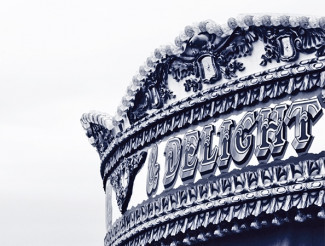
Johns Hopkins UniversityEst. 1876
America’s First Research University
Ballyhoo

Ballyhoo, as a word and as a title, is a paradox. What joy in saying it—Ballyhoo!—and yet, what performance and emptiness—O.E.D.: “ a showman’s touting speech.”
For several years now, I’ve been interested in the cultural, personal, and even political (and always paradoxical) dimensions of humor, comedy, laughter. When I take stock of the world, it often seems quite absurd to me; and it occurs to me that ours is an age in which the lines between jest and earnestness are increasingly blurry and thin. (In part, this comes from a common misperception: that only the serious is real, and that the absurd is somehow unreal.)
And yet, the more I study the subject, the more I understand that these lines have always been blurry and thin. Parody is a mere changing of a few words from the original text; thus, the serious becomes the silly, the sensical becomes the nonsensical, the heroic becomes the mock-heroic. Our significance, it might be said, is forever precarious.
Poetry, I believe, is a natural medium for investigating humor because, like most humor (slapstick aside), poetry is a linguistic medium. Often, a poem hinges on turns—of phrases, of images, of ideas—similar to the way jokes hinge on punchlines. In an essay that has been influential on me, “Bottom’s Dream: The Likeness of Poems and Jokes,” the poet Howard Nemerov offers the similarities proposed in the essay’s title:
So we have: economy of materials.
sudden reversal of the relations of the ele-
ments.
introduction of absurdity, but
the apparent absurdity, introduced into the
context of the former sense, makes a new
and deeper sense;
the hidden is revealed.
(565)
As I was writing Ballyhoo, I had the revelation that so many of my social interactions—from trivial greetings in the hallways, to reunions with old friends—depended on comic performance and laughter. I realize this is necessary human behavior, perhaps, but it also seems to me “an apparent absurdity.” One plays, at times, The Fool. (Incidentally, I have always been drawn to Shakespeare’s clowns and fools—those who can speak the truth only because the truth is couched in wordplay, humor, comic performance—and these fools and clowns show up in Ballyhoo.)

Yet Nemerov adds, “In general, to succeed at joking or at poetry, you have to be serious” (566). I began to think of these poems as investigations into the quiet spaces before, between, beyond the punchlines. In a way, the poems are like little counterpunches to the punchlines forever coming from the exhausting performance of the comic self.
For, as almost anyone can tell you, the joker is never too far from the griever; the poet is an elegist. The laugh is always fringed with sadness, the prank with cruelty, the satire with critique. But this makes of poets and joke-tellers idealists—people for whom the world is imperfect, yet who believe, perhaps, that by joking and by writing poetry, there exists a form of repair.
And yet…(here comes a similar kind of turn to the poem’s volta, the joke’s punchline)…laughter still enchants me. It sounds reductive and cliché, even elementary, but there is a magical quality to the laugh—and to the situations in which the serious rubs up against the comic but, ultimately, dissolves into laughter. I don’t want my poetry to be disenchanted with the world; in fact, I want the exact opposite. I hope that many of the poems meditate on these serious subjects with a sense of wonder, even whimsy, so that what it means to be purely Tragic or purely Comic is—as it is with Truth, Identity, Happiness, Memory, and all the other capital-letter abstractions—slippery, ever-elusive.
Hastings Hensel teaches creative writing at Coastal Carolina University. He is the author of Ballyhoo, Winter Inlet and Control Burn. His poems have appeared in New South, The Greensboro Review, Cave Wall, 32 Poems, and elsewhere.
Works Cited
“ballyhoo, n. 1.” Oxford University Press, March 2019. Web. 19 April 2019.
Nemerov, Howard. “Bottom’s Dream: The Likeness of Poems and Jokes.” The Virginia Quarterly Review. Vol. 42, No. 4 (Autumn 1966). pp. 555-573. Print.


